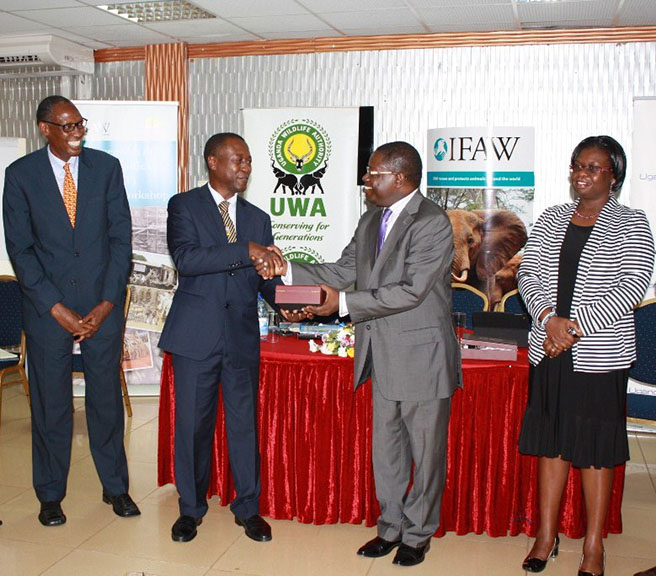New Training Program Improves Regional Capacity to Combat Wildlife Trafficking
General Inquiries
Tel:+254 711 063 000
Ngong Road, Karen, P.O. Box 310
00502 Nairobi, Kenya
A training workshop to increase the expertise of law enforcement officers to tackle wildlife trafficking began today in Kampala, Uganda.
Hosted by the Uganda Revenue Authority (URA) in partnership with International Fund for Animal Welfare (IFAW) the workshop aims to empower officers from Customs Departments, wildlife law enforcement and wildlife management authorities with the necessary skills to deter wildlife trafficking. Participants are drawn from Kenya, Uganda, Ethiopia, Rwanda, Tanzania, Democratic Republic of Congo, Burundi, South Sudan and Sudan.
The training is part of a larger strategic framework to strengthen the law enforcement response to combat wildlife crime at the regional level by improving cooperation among African countries’ law enforcement authorities. The work is being carried out under a continent-wide program called ARREST (Africa’s Regional Response to Endangered Species Trafficking) and implemented through a partnership between IFAW, African Wildlife Foundation, and Freeland Foundation with support from the U.S. Department of State, Bureau of International Narcotics and Law Enforcement Affairs.
This and other training opportunities under the ARREST program will ensure law enforcement officials from the Horn of Africa, Central, and East Africa are better equipped to combat wildlife trafficking and reporting of wildlife crimes. They will take the form of practical, interactive sessions, field visits, hands-on skills used in the identification and correct handling of species commonly trafficked in the regions. Training will focus on the trade status of key species, dynamics of wildlife crime and enforcement, relevant international trade conventions and organizations, and inter-agency cooperation to improve international and regional communications.

James Isiche, Regional Director IFAW, EA presents an appreciation gift to Richard Kamajugo, Commissioner of Customs at URA. (Kaddo Ssebunya, AWF Uganda Country Director (left) and Ms. Doris Akol, Commissioner General, Uganda Revenue Authority (far right) look on. Photo credit: International Fund for Animal Welfare
Wildlife trafficking represents a serious threat to the survival and conservation of many wildlife species globally. Elephant ivory, rhino horn, reptile skins and leopard skins are amongst the most illegally traded wildlife products in the region.
“We at IFAW have long recognized the intricacies of wildlife trafficking and have in response strived to nurture and support transnational and multiagency networks as a means of countermanding this iniquity,” said Azzedine Downes, IFAW' President and CEO.
“IFAW’s partnership with organizations such as the Uganda Wildlife Authority (UWA) and the Uganda Revenue Authority (URA) recognises that success in addressing wildlife trafficking can only be attained by forming linkages or networks that allow for structured and sustained coordination and collaboration among law enforcement agencies not only across departments but across national borders and continents.”
ARREST partner AWF has conducted similar trainings in other countries to strengthen in-country and cross-border collaboration in combating the illegal wildlife trade.
“Combating the illegal wildlife trade effectively requires an all-of-government approach,” said Patrick Bergin, African Wildlife Foundation CEO. “This war will not be won by investing only in rangers. We need magistrates, police, border agents, revenue agents and wildlife authorities all on side and working together efficiently and effectively.”
Wildlife trafficking is one of the world’s most lucrative criminal activities – valued at billions of US dollars annually. It ranks in the top most lucrative transnational organized crimes, behind drug trafficking, money laundering and counterfeiting. According to an IFAW report Criminal Nature: The Global Security Implications of the Illegal Wildlife Trade, ivory smuggling and the wildlife trade has been linked to other forms of organized crime including terrorism, illegal arms and drug trafficking.
Since 2007, IFAW has held more than 76 training workshops on the prevention of wildlife trafficking where trained more than 2,600450 officers from 37 countries in Africa, the Middle East, Asia, Oceania, and the Caribbean have been trained. since 2006. Trainings have been held in collaboration with national institutions in the respective countries and other organizations including Interpol, Lusaka Agreement Task Force (LATF) and Ethiopian Wildlife Conservation Authority (EWCA).